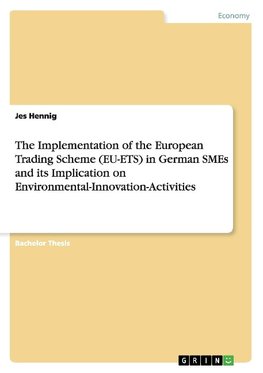
-
 Anglický jazyk
Anglický jazyk
The Implementation of the European Trading Scheme (EU-ETS) in German SMEs and its Implication on Environmental-Innovation-Activities
Autor: Jes Hennig
Bachelor Thesis from the year 2014 in the subject Economics - Innovation economics, grade: 2,0, University of Hamburg, language: English, abstract: The implementation of the European Trading Scheme (EU-ETS) regulatory in 2005 is the consequence of the rising... Viac o knihe
Na objednávku, dodanie 2-4 týždne
25.92 €
bežná cena: 28.80 €
O knihe
Bachelor Thesis from the year 2014 in the subject Economics - Innovation economics, grade: 2,0, University of Hamburg, language: English, abstract: The implementation of the European Trading Scheme (EU-ETS) regulatory in 2005 is the consequence of the rising emission of greenhouse-gases (GHG). Currently, Europe emits
about 3.74 billion tonnes pollution per year, which is high but - looking from a global angle nevertheless below the US' and China's level of emissions. The reason for the increased pollution is the growth of demand and consequently productivity that has compound over time but needs to be stopped. The EU-ETS is Europe's instrument to achieve the Global Temperature Target, whose goal is to decrease the overall temperature by two-degrees Celsius and thereby to reduce the negative externalities for the society and in the long run for the world. Furthermore the aim of the EU-ETS is to stop the growth of emissions of greenhouse gases and to declare binding targets for 2020 in order to reduce emissions by 20 per cent compared to the level of 2005 . The implementation of the regulatory has marked a turning point in the European policy because it was the first time that a marketbased approach of tradable permits got implemented in a cross-national way. It is the biggest implementation of a cap-and-trade scheme and the engine of the European climate policy. The German industrial landscape is shaped by small and medium-sized Enterprises (SMEs) 1 that account for approximately 99.7 per cent of all enterprises in Germany. Hence, around half of the German companies who need to participate in the EU-ETS are SMEs. The European Commission stated in their Enterprise and Industry Fact Sheet released in 2013 that "German SMEs continue to be more innovative and internationally orientated than most of their EU partners". As SMEs are important for German economy and are innovative orientated it is especially important to investigate how they are implementing the above-described EU-ETS. With the help of the linkage between these two key aspects - the innovative SMEs in the German economy and the implementation of the EU-ETS - this thesis investigates how German SMEs implement the EU-ETS in their value chain and in how far they - as a consequence of the EU-ETS regulatory - are developing innovations regarding pollution reducing measures.
- Vydavateľstvo: GRIN Verlag
- Rok vydania: 2015
- Formát: Paperback
- Rozmer: 210 x 148 mm
- Jazyk: Anglický jazyk
- ISBN: 9783656945369












